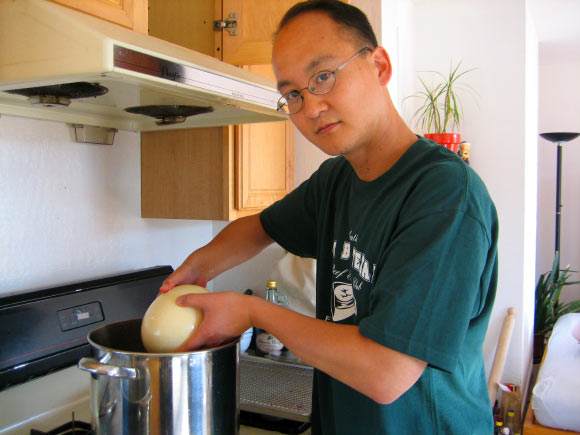In research that could dramatically reduce costs for cancer treatments and food production, a team of chemists from Australia and the United States, led by Prof Gregory Weiss of the University of California, Irvine, has developed a way of ‘unboiling’ hen egg whites.

Scientists have found a way to unboil eggs. Image credit: Eugene Kim / CC BY 2.0.
“Yes, we have invented a way to unboil a hen egg,” said Prof Weiss, who is the senior author of a paper published online in the journal ChemBioChem.
“In our paper, we describe a device for pulling apart tangled proteins and allowing them to refold.”
“We start with egg whites boiled for 20 minutes at 90 degrees Celsius and return a key protein in the egg to working order.”
Prof Weiss and his collaborators have struggled to produce or recycle valuable molecular proteins that have a wide range of applications but which frequently misfold into structurally incorrect shapes when they are formed, rendering them useless.
“It’s not so much that we’re interested in processing the eggs; that’s just demonstrating how powerful this process is,” Prof Weiss noted.
“The real problem is there are lots of cases of gummy proteins that you spend way too much time scraping off your test tubes, and you want some means of recovering that material.”
But older methods are expensive and time-consuming: the equivalent of dialysis at the molecular level must be done for about four days.
“The new process takes minutes. It speeds things up by a factor of thousands,” Prof Weiss said.
To re-create a clear protein known as lysozyme once an egg has been boiled, the scientists add a urea substance that chews away at the whites, liquefying the solid material. That’s half the process; at the molecular level, protein bits are still balled up into unusable masses. They then employ a vortex fluid device.
Shear stress within thin, microfluidic films is applied to those tiny pieces, forcing them back into untangled, proper form.
“This method could transform industrial and research production of proteins,” the scientists said.
For example, pharmaceutical companies currently create cancer antibodies in expensive hamster ovary cells that do not often misfold proteins. The ability to quickly and cheaply re-form common proteins from yeast or Escherichia coli bacteria could potentially streamline protein manufacturing and make cancer treatments more affordable.
_____
Tom Z. Yuan et al. Shear-Stress-Mediated Refolding of Proteins from Aggregates and Inclusion Bodies. ChemBioChem, published online January 23, 2015; doi: 10.1002/cbic.201402427







